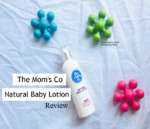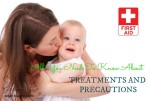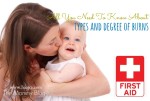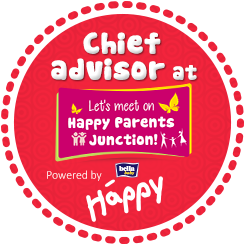 As a parent, it’s really imperative to learn basic First Aid. We all know how much it hurts (the parents…emotionally mostly) if our babies take a fall. If your little bub has started achieving developmental milestones like crawling, rolling, pulling themselves up, reaching out etc, then this post is very important for you. Also a good read for those parents whose children are generally known as ‘calamity Janes’ in the playground 😀
As a parent, it’s really imperative to learn basic First Aid. We all know how much it hurts (the parents…emotionally mostly) if our babies take a fall. If your little bub has started achieving developmental milestones like crawling, rolling, pulling themselves up, reaching out etc, then this post is very important for you. Also a good read for those parents whose children are generally known as ‘calamity Janes’ in the playground 😀
The key in most injuries is: DO NOT PANIC. Guess the number of times this rule is broken each time calamity Jane struck our house? Answer: Every. Bleddy. Time. Daddy Dear hits panic button anytime our baby starts bawling after getting hurt. His pulse racing, face and palms sweating, eyes glazed and staring into oblivion (daddy’s, not the baby).
I agree it gives us all a heartattack, but we have to start by assessing how bad the injury is. In most falls and the accompanying screaming, the baby cries mostly because he is startled and shocked. As a parent or a witness to the incident, your instinct will guide you into understanding the severity of the situation. Comforting the baby and a quick physical evaluation of the child will help you in deciphering if a trip to the Hospital, or a call to the Doctor is required.
Incase of any severe fall or head injury, it’s crucial to closely monitor the baby for the next 24 hours. A hospital visit is REQUIRED if ANY (one or more) of the following are observed:
- Unconscious or fainted after injury
- Drowsiness or alteration in consciousness
- Severe and persistent headache (baby will try and shake head whilst also crying)
- Vomiting (different from a regular baby spitup)
- Dizziness / double or blurred vision (baby will show peculiar eye movement)
- One pupil (black part of the eye) visibly larger than the other
- Neck stiffness
- Convulsions or fits
- Strange behavior (baby is less active/alert)
- Very slow and rapid pulse
- Any unusual breathing pattern
What to do in case of nose/ear/wound bleed following an injury?
Swelling / Bleeding from Nose or Ears –
Apply an ice pack immediately. Area for application needs to be the nose & cheeks or bridge of nose. You can use the frozen vegetable packets from your freezer, but ensure that anything which you apply, needs to be covered in a cloth or towel and NOT touching the skin directly.
- DO NOT block the nose or ears, let it drain.
- DO NOT press down on the wound if you suspect a skull fracture.
- Arrange to go to the hospital for further treatment.
Bleeding from the wound –
It’s important to stop the bleeding. You can do so by applying direct pressure.
- However DO NOT press down on the wound if you suspect a skull fracture.
- Arrange to go to the hospital for further treatment.
In most of the open wounds, it is advisable not to attempt at cleaning the wound as it may trigger further bleeding. Keep it covered with a sterile bandage. If one gets soaked, apply another one on top and so forth.
If you do suspect a skull fracture, or an injury to the spine or neck after a fall, try to keep your baby calm and still. By moving them you may end up causing more harm. Call your local emergency number immediately for medical support at the scene of the fall.
According to Redcross “once you have treated the swelling by applying something cold to the baby or child’s head injury, and if they are not displaying signs of a serious head injury, you could let them sleep. Ensure you check on them regularly.” You can imagine how shaken the baby must also be.
It does not mean each bump and fall requires a trip to panic room. As a parent, you will ‘know’ which injuries require immediate medical assistance. So follow your instinct. No one knows your baby more than you. When in doubt, DO call the doctor. Following any head injury remember… ‘Evaluate with your head and not your heart’
End of the day, the best way to help your baby is to make their environment safer. Towards lesser injuries and more milestones 🙂
And let us know if you have any tips. We would know to have them included in the post. Take care. Stay safe 🙂












[…] Source: Basic First Aid Tips for Babies and Toddlers […]